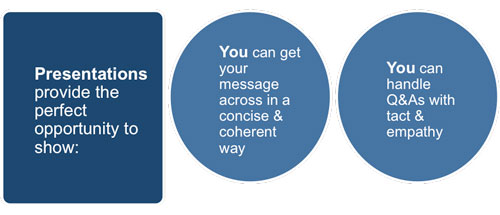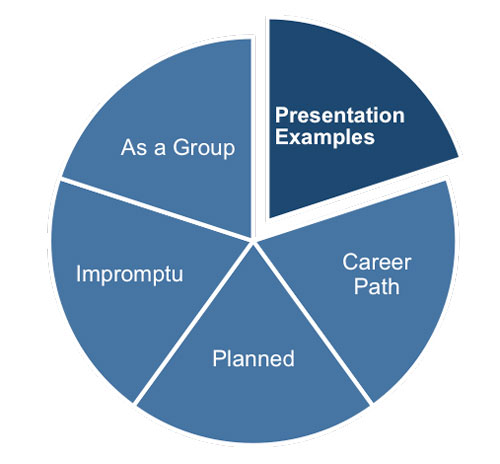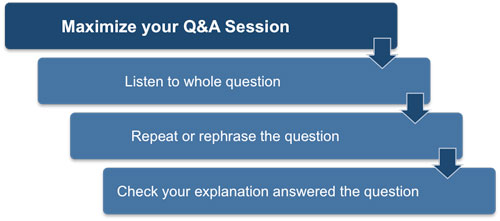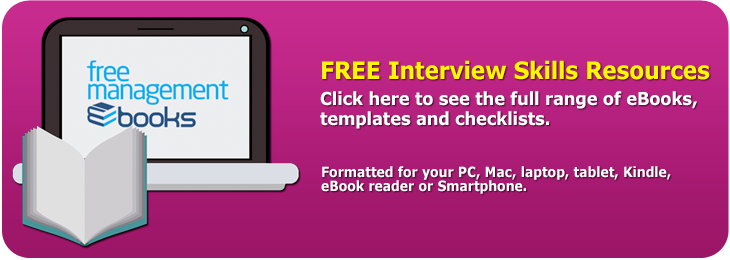Presentation Exercises
Presentations give you the perfect opportunity to show that you can get your message across in a concise and coherent way. It also allows you to show your ability to handle a question and answer (Q&A) session.
 |
An interview exercise gives you the greatest level of control over your behaviors, providing you with a golden opportunity to stand out from the crowd. So before you get to the interview you should make sure that your abilities to plan, prepare, and deliver a presentation are the best they can be.
The most obvious competency that you are being asked to demonstrate is 'interpersonal communication,' especially your ability to communicate a message in a clear and persuasive way. This covers three separate areas:
1. How you organize the material.
2. How you actually present it.
3. How you handle and answer questions.
However, there are two other areas that are often tested implicitly during the presentation exercise. These are:
Enthusiasm for the Role
Do you sound as though you really want to be there?
This aspect of job selection is often overlooked by candidates but most employers want someone who has a genuine enthusiasm for what they do. You need to deliver your presentation with a certain amount of passion - don't go over the top but you must engage the audience of assessors. They may be listening to a whole series of presentations on the same or similar topics so don't underestimate how much energy you need to put in if you are going to capture and hold their attention.
Organizational/Strategic Interpretation
Try to demonstrate that you can add value beyond that which the employer expects from the role.
This is easier in some presentations than others; it depends on the topic you're given, but it is often this 'added value' that marks out the successful candidates.
Not everyone is a natural presenter, but there are ways you can make the best of your own individuality and play to your strengths. If you want to read more on the topic of presentations then our trilogy of Presentation Skills eBooks described below offer you practical advice.
Planning a Presentation - describes a simple four-step process to adopt when planning a presentation. This enables you, even with minimal time, to give a strong and persuasive performance to any audience.
Preparing a Presentation - following on from 'Planning a Presentation' this eBook outlines how to take your plan and create a presentation that is based on your aim and audience. It helps you define a key message statement and identify the key points you want your audience to take on board.
Delivering a Presentation - is the final of these three presentation eBooks and explains how to keep your audience engaged whilst you deliver your presentation and how best to organize the material to suit your audience.
 |
There are several ways presentations can form part of an interview exercise:
- Each candidate is given a topic to present in a predefined timeframe. This may or may not be related to the role or organization. You will be told what facilities are available to you, e.g. PC, Mac, flip-chart, overhead, etc.
- Within a group exercise. This may be on your own or as part of a group.
- You are asked at some point in the interview process to provide a verbal account of your career path. This could be the most important presentation you give and you need to leave your audience with the view that you are the one for the role.
- Impromptu presentations are often a favorite. You will only have a few minutes to think about how to present the topic you have been given.
Whatever type of presentation you are faced with you need to demonstrate your enthusiasm for the role. You can achieve this by being enthusiastic in your delivery and showing that that you really want to be there and that you believe what you have to say is important.
The behaviors you need to demonstrate will reflect your level of planning and preparation as well as how you actually present your material. A significant element you must display is the depth and quality of your research. This is made easier with the Internet but be mindful to check that the information you have is up to date and accurate.
Any argument you present must be done in a persuasive manner. Be aware of how your tone of voice and pace of delivery affect how successful you are in doing this. The extent of your success in this will reflect on how well you have planned putting your message and key points across to your audience.
It is essential that you make effective use of the time available to you and avoid getting sidetracked by a question. Remember this may only be asked to see how you handle interruptions. It also shows how confident you are with your topic and how you assert control during the presentation.
Include time in your preparation to anticipate the types of questions you could be asked. Don't be unwilling to ask for clarification when you are not clear about what is being asked and always be honest - if you don't know, say so.
 |
There are a few ways to keep your focus throughout the Q&A session and to ensure that you answer the question that was asked.
- Listen to the 'whole' question. Do not interrupt until the person asking the question gives you the cue to reply.
- Repeat or rephrase the question as appropriate so that not only you, but the rest of the audience are clear what was asked.
- Check after your explanation that the question was answered to their satisfaction. Make sure that you give everyone the opportunity to ask questions.
If you can see there are more questions than you have time for then ask these individuals what topic their question relates to. This enables you to group the question by topic and avoid unnecessary repetition in this session.
You may also be interested in:
Preparing for Interview Exercises | In-Tray or In-Basket Exercise | Role Play Exercise | Group Exercise | Presentation Exercise | Handling the Media Exercise.


